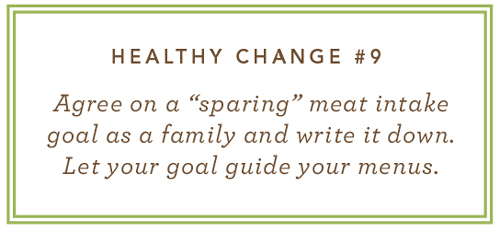Meat Sparingly

The quick answer: In the end, our care of animals will say everything about what kind of humans we have become.
______________________________________________________________________________________________
The Devil’s Herd
I love the old West . . . the ranches and barns . . . cattle in the fields . . . the smell of the tackroom . . . even the aroma of corrals . . . all those cowboy values and traditions. My late Uncle Fred was as good a cowboy as you might meet. He cussed a little and got to church late but was good to the core. The picture above is his daughter Peggy—who I got in plenty of mischief with as a child—sitting pretty on a handsome cutting horse. At Fred’s passing, I was moved to remember his colorful character in this bit of doggerel.
I love western music too. My favorite song is Johnny Cash singing Ghost Riders in the Sky. The song, I think, could be a warning for the exploitation of animals by the food corporations, for it tells of a group of ghost cowboys who had fallen short in their lives and were doomed to endlessly ride the skies, chasing the devil’s stampeding herd. It closes with this cowboy call to repentance (try singing it):
As the riders loped on by him he heard one call his name
If you want to save your soul from Hell a-riding on our range
Then cowboy change your ways today or with us you will ride
Trying to catch the Devil's herd, across these endless skies
The good Lord gave man dominion over the animals but with that power came the duty of care. This post is a call to reconsider our relationship with the animals of the world, lest we too wind up chasing the devil’s herd. Yippie yi yaaaaay.
The Blue Zones
Want to enjoy a long life? Dan Buettner traveled around the world, studying the longest-lived societies. He summarized his findings in a book, The Blue Zones. Bottom line: Though these long-lived peoples eat a variety of foods based on where they lived, they universally eat very little meat. With the exception of special feasts, meat is used to flavor food rather than as the main course.
Chronic Disease
Meat is good for us—it’s the only natural source of vitamin B-12 which is essential to our health—but too much meat is problematic. In the modern American diet (MAD) we eat three or four times more meat than we should. An Oxford University study of the English diet found that reducing meat intake to three servings weekly—the amount a person might consider “sparing”—would reduce mortality from chronic diseases. Specifically, they projected these benefits for England:
- 31,000 fewer heart disease deaths each year.
- 9000 fewer deaths from cancer.
- 5000 fewer deaths from stroke.
World Wars
Health improves when we eat less meat. Due to World War I shortages, Denmark was forced, as a nation, to eat a Word of Wisdom Living diet—mostly plant foods with very little meat, less milk and butter than before, and practically no alcohol, coffee, or tea. They even ate a “war bread” of whole grain rye flour.
Later, Dr. Martin Hindhede, a researcher in low-protein diets, studied the result. Despite the stress of war, there was an immediate drop in mortality rates that continued through the war but disappeared post-war as people returned to their normal habits.
Hindhede saw an important lesson about the body’s recuperative powers—improving diet quickly improves health. During World War II this mortality benefit was again observed in other affected countries.
The Scriptures
It would be a failure of reverence to overlook scriptural guidance. The scriptures have cautioned about meat eating. In Genesis we are counseled to make herbs and fruits our meat; in Moses’ time Israel was restricted in what meats they could eat, and how animals should be killed; Daniel with his three friends benefited from eating plant foods (pulses) instead of the king’s meat; and the Apostle Paul warns darkly of carnal living.
The canonized LDS scripture known as the Word of Wisdom counsels that flesh of animals was ordained for the use of mankind, but with thanksgiving, and the admonition to eat sparingly—perhaps the best and most succinct guidance found anywhere. These words reflect a duty of care.
The definition of sparing is left to each person's inspiration. For our use, we aim to get two-thirds of our protein from plants and just one-third from animal sources. (In a future post on protein, we’ll return to this 1:2 ratio.) This is equivalent to three servings of meat (excluding two servings of fish) weekly, though we spread it around. Research reported in The China Study suggests this is a healthy level—Americans are reported to eat four times this amount.
Pollution
Do you worry about environmental pollutants but find organic foods too expensive? One study estimates that 85% of our pollutant exposure comes in the meat we eat. The surest way to reduce your exposure to pollutants, then, is to reduce meat consumption, as in sparing. It’s also cheaper.
Best Methods
After a person resolves the amount of meat to eat, two questions remain:
- What are the healthiest meats? The simplest guidance is to eat a variety of meats including fish and fowl, choosing pastured or grass fed meats over industrially fed (CAFO) when possible, and minimizing processed meats like bacon, ham, etc. Here’s a rule: Eat less, but better.
- How should meat be prepared? Lower cooking temperatures produce less carcinogenic or harmful byproducts. Stewed meat, especially if cooked with herbs, is better than baked meat; baked meat is better than fried; and fried is better than BBQ’d meat. That’s pretty simple.
Ready for Skip's beef stew recipe?
Healthy Change

Please comment: Share the ways you feature meat in your diet. Where do you find healthy meat? How do you use it as a condiment, rather than the main course? What do you do to show reverence for the Creation of animals?
Need a reminder? Download our Healthy Change. Print and fold, then place in your kitchen or on your bathroom mirror to help you remember the Healthy Change of the week.
 Tuesday, February 28, 2012 at 9:10AM | by
Tuesday, February 28, 2012 at 9:10AM | by  Skip Hellewell |
Skip Hellewell |  17 Comments |
17 Comments |  8 References | | in
8 References | | in  healthy change,
healthy change,  meat,
meat,  word of wisdom |
word of wisdom |  Email Article
Email Article 



